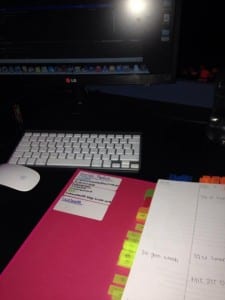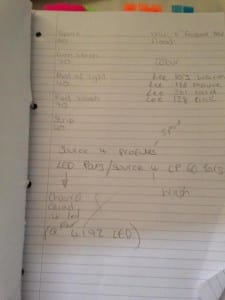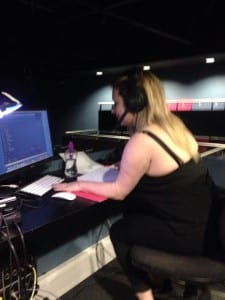Schedule Calendar View
Rehearsal Scedule weekly view
Activity Plan
Category: Emmie Kearns
Technical Documents
We Did It!!
(Show Day Snap from Kearns 2015)
The time has come and now has passed and what a crazy, insightful experience it has been. Being stage manager for Forefront Theatre has been amazing and I’m glad that it was with this company that I explored my first ever experience of being Stage Manager. Over the past few months I have enjoyed watching the company grow and come from nothing to a piece that explores the expectations of what society suggests you need to fill. At the beginning of the process I took on the responsibility of organising rehearsals and making sure everyone knew where they had to be and what time. Also as we was devising a piece from scratch it was very difficult to work with the lighting and sound designer Clare to discuss designs for our performance, this was an ongoing process that came together mostly towards the end of the process before tech day. The piece was a huge success in getting across what we wanted, however as we all know, there is always room for improvement.
Our debut performance of Shoes to Fill in terms of the technical aspects of the performance went smoothly. During the runs we did on performance day, there was a unanimous decision, with the support of Diane, that during two of our original songs the cast sang better a cappella than with the backing track. With this decision being made it meant that my Qlab file had to be updated, to make sure all the cues still flowed correctly. After this was edited I sat and went through the cues without the cast in order to make sure they were all in the correct order. Even with these last minute changes the performance still went well. As the performance wasn’t very tech heavy, as we didn’t have any projections and very little sound files, it all depended on the lighting to get across what we wanted, for example for each verbatim there was the use of a steel blue spotlight, on a microphone, which was always downstage left. These choices of lighting were very specific to each moment and scene of the performance. During rehearsals for our piece there were scenes where we used torches in a blackout, when rehearsing these scenes it was difficult to see the effectiveness this has, this was for many reasons. Some including that we weren’t on stage so we couldn’t tell if the torches were powerful enough in the space, another being that we could never get a full blackout either. It turned out that the torches looked really good in the space and something that stood out in the piece.
I feel this process has been a great experience with me and has really opened my eyes into what goes on behind the scenes to performances. It would be nice if Shoes to Fill wasn’t just a one time performance for Forefront Theatre but with the cast all from various different parts of the country this may prove to be a challenge. The company has plenty of room to grow, if it was to do so. This is the end of one journey for us, but there is nothing stopping this from being the last.
Works Cited
Kearns, E (2015) Show Day Snap
Tech Day arrived..

(Tech Day from Kearns 2015)
After a sit down with Tamsyn, we came to the conclusion that not everybody would be needed for the whole session we had to set up tech. It was decided that between the hours of 9 and 12 that only myself, Clare, Tamsyn and Eden would be needed and the rest of the cast could arrive at 12 for a cue to cue. During this time the rest of the company would either be flyering or rehearsing specific scenes. The intention behind this was so we use the time as productively as possible. This enabled us to run things as quickly and as smoothly as possible. During the run up to tech day, all the relevant paper work was created by myself and Clare, such as lighting cue sheets, sound cue sheets and loading the sound onto Qlab. Having all this prepared would enable the tech day to go as smooth as possible.
For the tech session, as stage manager I created a schedule so time was effectively used and also so the cast could have an opportunity being in the space also. This enabled us to communicate more easily with the in house tech team also. Martin helped set up all the microphone’s that were needed, we needed to microphone’s on stands, one wireless microphone and the use of the boom microphones also (overhead microphones). Whilst this was being done, me and Clare went up to the tech box to set up the lighting and sound. As we already had the sound files set up on Qlab this helped the process go quicker. I had never used Qlab before and this was a learning curve for me. The lighting was all focused and the levels of sound would be sorted on performance day.
had the sound files set up on Qlab this helped the process go quicker. I had never used Qlab before and this was a learning curve for me. The lighting was all focused and the levels of sound would be sorted on performance day.
As our performance wasn’t that tech heavy, we sped through everything, meaning we could have to cue to cues with the cast, which was really helpful for us. Overall I feel the day was a huge success and went as smoothly as possible. We worked well as a team with the technical team. This experience meant that performance day was approaching and I couldn’t feel more comfortable and positive about the upcoming performance.
(Tech Notes from Kearns 2015)
Works Cited
Kearns, E (2015) Tech Notes
Kearns, E (2015) Tech Day
Work In Progress.
As a company we felt it would be a good idea to show our progress for Shoes to Fill. We decided to invite Refract Theatre Company along to a rehearsal in which both companies would show the work they had so far. We saw this as a good opportunity to perform to an audience who would then have the confidence and ability to critique and applaud our work. These work in progress showings are crucial to the our development phase as you can act on the feedback to help improve and develop the piece so that what we want to achieve comes across.
Matt Trueman in the Guradian proposes that ‘Audiences are used to watching incomplete and embryonic shows, but genuine novelty and risk should be at the heart of the work on display.’ (2009) This statement made by Trueman goes completely against the purposes of work in progress showings. If we didn’t do these showings that how would the work we are trying to achieve get better, which in itself is a risk, one we, as a company aren’t willing to take. That’s not to say as a company we don’t take risks but where there is an opportunity to improve then it is taken.
Refract Theatre, a company of ten members came along and they watched the material we had so far and then provided comments afterwards. We felt this was a perfect opportunity to develop a relationship with fellow companies, offering support for each other where possible. There was lots of positive elements of feedback that we received from then alongside some constructive criticism to help us improve. I feel that the feedback that was given helped us develop our performance. It also helped the performers get used to the responses that you may get from the audience such as laughter allowing them to know when time is needed to be taken when saying lines. This was a positive thing for us. (P.S. Refract had some pretty awesome work to show back!)
My overall view as stage manager I felt some things could have gone more smoothly and it would have been great if we could have performed without scripts. It also helped me realize how important lighting is to some of the scenes in order for it to achieve the response we would like, meaning I have to make sure the lighting helps do this. Another thing we need to work harder on is the transitions between the scenes, we previously had the cast sat at the back of the stage throughout however from feedback and observing myself I feel this may need to change. My next step is to now sit down with the lighting and sound designer and director and discuss exactly what lighting is needed and where sound is needed also, so it is all ready for our final production meeting before tech day. (Exciting Stuff!!)
I am very proud of the progress the company has made and feel positive that it will all come together in the short amount of time we have left.
Until next time,
Emmie
Works Cited
Trueman, M. (2009) Keeping work-in-progress theatre up to scratch. [online] London: The Guardian Newspaper. Available from http://www.theguardian.com/stage/theatreblog/2009/sep/15/work-in-progress-theatre-scratch [Accessed 28 April 2015].
